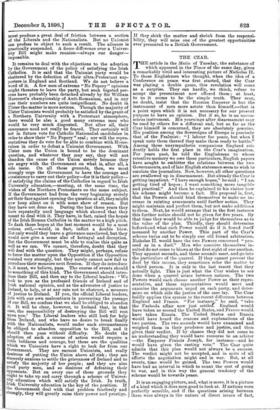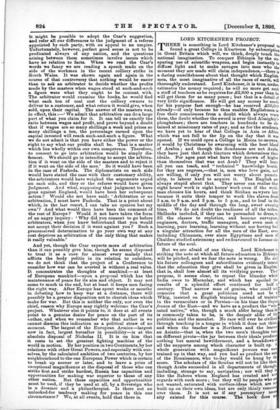THE CZAR. T HE article in the Main of Tuesday, the
substance of which appeared in the Times of the same day, gives a remarkably vivid and interesting picture of Nicholas II. To those Englishmen who thought, when the idea of a, Conference on peace was first started, that the Czar was playing a double game, this revelation will come as a surprise. They can hardly, we think, refuse to accept the presentment now offered them ; at least, to us it seems to be the simple truth. They may, no doubt, insist that the Russian Emperor is but the instrument of men more astute than himself,—that is a point upon which it is not necessary for our present purpose to have an opinion. But if so, he is an uncon- scious instrument. His yearnings after disarmament may be used by others for a different end, but so far as the Czar himself is concerned, they are absolutely genuine. His position among the Sovereigns of Europe is precisely that of the Psalmist: "I labour for peace, but when I speak unto them thereof they make them ready to battle." Among these unsympathetic companions England evi- dently holds the first place in the Czar's imagination. For years past, he told the Englishman to whose retentive memory we owe these particulars, English papers have sought to embitter the relations between the two Governments, and of late English statesmen seem to wish to emulate the journalists. Now, however, all other questions are swallowed up in disarmament. But already the Czar is getting impatient. " I have enough hopes," he said ; " I am getting tired of hopes ; I want something more tangible and practical." And then he explained to his visitor how his scheme might become a fact. His proposal is, first, that the Powers should. bind themselves to make no in- crease in existing armaments until further notice. They might maintain and perfect them, but not make additions to them. Next, he would arrange that in the first instance this further notice should not be given for five years. By that time they would be able to judge for themselves as to the value of the plan. Thirdly, they should determine beforehand what each Power would do if it found itself menaced by another Power. This part of the Czar's scheme turns out to be simply our old friend arbitration. Nicholas II. would have the two Powers concerned " pro- ceed as in a duel." Men who conceive themselves in- sulted do not come to blows at the first sight of one another. They appoint seconds, and these seconds meet, and go into the particulars of the quarrel. If they cannot prevent the duel by this means, they sometimes refer the matter to a third person. It is only in the last resort that they actually fight. This is just what the Czar wishes to see done when a quarrel arises between nations. The two Powers would. each choose another Power as their repre- sentative, and these representatives would meet and examine the arguments urged on each party, and deter- mine on which side the justice of the case lay. The Czar boldly applies this system to the recent difference between England and France. "For instance," he said, " take the Fashoda affair now just settles. England would have taken as second. the United States, and France would. have taken Russia. The United States and Russia. would have heard the reasons and explanations of the two parties. The two seconds would have examined and weighed them in their prudence and justice, and then given their verdict. If by chance they did not come to an understanding they would have recourse to an arbiter —the Emperor Francis Joseph, for instance—and he would have given the casting vote." The Czar quite admits that this plan would not always be a success. The verdict might not be accepted, and in spite of all efforts the negotiation might end in war. But, at all events, time would be gained. The two Powers would have had an interval in which to count the cost of going to war, and in this way the general tendency of the scheme would be towards peace.
It is an engaging picture, and, what is more, it is a picture of a kind which it does men good to look at. If nations were perfectly sensible, and if the questions arising between them were always in the nature of direct issues of fact, it might be possible to adopt the Czar's suggestion, and refer all our differences to the judgment of a referee appointed by each party, with an appeal to an umpire. Unfortunately, however, perfect good sense is not to be predicated always of any nation, and the questions arising between them sometimes involve issues which have no relation to facts. When we read the Czar's words we fancy we are reading a speech made on the side of the workmen in the recent colliery strike in South Wales. It was shown again and again in the course of that controversy that nothing would be easier than to ask an arbitrator to decide whether the profits made by the masters when wages stood at such-and-such a figure were what they ought to be content with. The arbitrator would examine the books, he would find what each ton of coal cost the colliery owners to deliver to a customer, and what return it would give, when sold, upon their capital. The answer of the masters was, in effect, this We admit that arbitration can do a large part of what you claim for it. It can tell us exactly the ratio between wages and profit, and prove beyond a doubt that if wages are so many shillings a week and prices so many shillings a ton, the percentage earned upon the ,capital invested will reach such-and-such a figure. What we do not admit is that you have either the power or the sight to say what our profits shall be. That is a matter which lies wholly within our own competence. Therefore, .to consent to go into arbitration would be simply dis- 'honest. We should go in intending to accept the arbitra- tion if it went on the side of the masters and to reject it if it went on the side of the men.' So it would have been in the case of Fashoda. The diplomatists on each side would have stated the case with their customary ability, the arbitrators would have weighed the arguments urged .on each side, and they or the referee would have given judgment. And what, supposing that judgment to have gone against England, would have been her subsequent action ? Would she not have said: Arbitration or no arbitration, I must have Fashoda. That is a point about which, in the last resort, I can take no opinion but my own'? And what would then have been the comment of the rest of Europe ? Would it not have taken the form of an angry inquiry : ' Why did you consent to go before arbitrators, when you knew beforehand that you would not accept their decision if it went against you ? Such a preconceived determination to go your own way at any cost deprives an arbitration of the only thing that makes it really valuable.'
And yet, though the Czar expects more of arbitration than it can possibly give him, though he seems disposed to treat it as a cure for almost every malady that afflicts the body politic in its relation to outsiders, we do not think that the project of a Conference to consider how war can be averted is without a real value. It concentrates the thoughts of mankind— at least of European mankind—upon a proposal which has the maintenance of peace for its aim and object. It may not come to much in the end, but at least it keeps men facing the right way. After Europe has spent weeks or months in debating how to keep war at a distance, there will possibly be a greater disposition not to cherish ideas which make for war. But this is neither the only, nor even the chief, reason why Europe may rightly welcome the Czar's project. Whatever else it points to, it does at all events point to a genuine desire for peace on the part of its author, and when we remember who that author is we cannot dismiss this indication as a political straw of no moment. The largest of the European Armies—largest now in fact, largest hereafter in possibility—is at the absolute disposal of Nicholas II. It is on him that it rests to set the greatest fighting machine of the world in motion. By her position in two Continents, by her relations with other Great Powers, and especially with our- selves, by the calculated ambition of two centuries, by her neighbourhood to the one European Power which is certain to break up sooner or later, and to leave a prize of exceptional magnificence at the disposal of those who can strike first and strike hardest, Russia has capacities and opportunities for making war superior to those of any other nation. But these capacities and opportunities must be used, if they be used at all, by a Sovereign who as a dreamer and a philanthropist. Is there not an unlooked-for tendency making for peace in this one circumstance ? We, at all events, hold that there is.























































 Previous page
Previous page